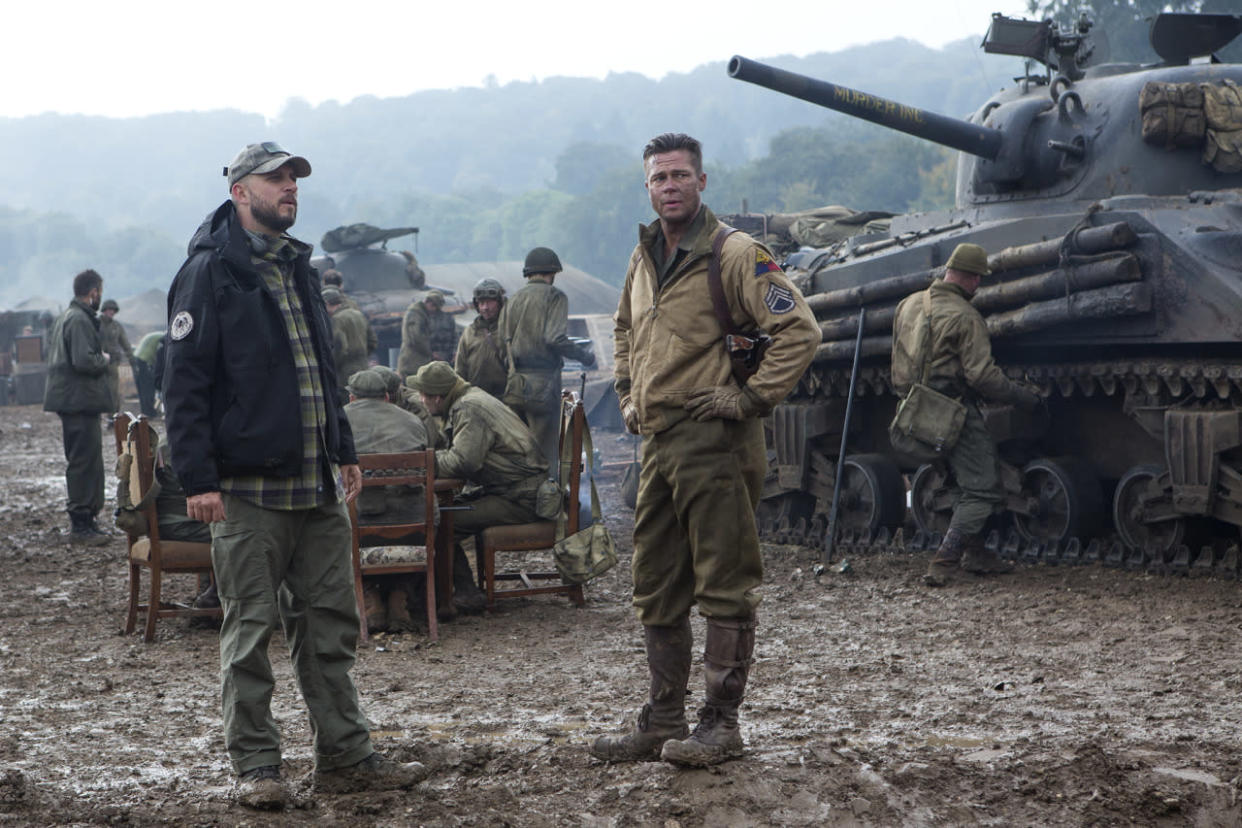'Suicide Squad' Director David Ayer: 5 Films to Know

Director David Ayer with Brad Pitt on the set of ‘Fury’ (Photo: Columbia Pictures)
Zack Snyder has had his hands on the reins of Warner Bros’ DC Comics-based movie universe – as director of Man of Steel, Batman v Superman, and the upcoming Justice League, as well as the producer of next summer’s Wonder Woman – but it’s David Ayer who brings some of the comic-book company’s key super-villains to the screen in this Friday’s Suicide Squad. It’s a seemingly natural fit, given that the 48-year-old filmmaker made his first mark in Hollywood as screenwriter of crime-based hits such as Training Day and The Fast and the Furious (as well as Kurt Russell’s LAPD drama Dark Blue and the Colin Farrell-led S.W.A.T.), and then built a filmography as a director of similar macho-fueled (and often team-oriented) action-dramas. Ahead of the debut of his most high-profile movie to date, here’s a handy guide to the films of the man chosen to assemble DC’s “worst of the worst.”
Harsh Times (2005)
Ayer’s script for 2001’s Training Day was informed by his teen-age years living in South Central Los Angeles, and he’d keep returning to that milieu on screen in the coming years. His 2005 directorial debut, which he helped finance by mortgaging his home, duplicates in most respects the central dynamic of its Denzel Washington-Ethan Hawke predecessor. Christian Bale lends the action some lunatic electricity as a former Army Ranger with more than a few screws loose, but Freddie Rodriguez is a snooze as his increasingly freaked-out sidekick. Despite its wealth of unintentionally funny overcooked dialogue, it established Ayer as an aggro filmmaker fascinated with issues of male ego, attitude, and camaraderie.
Street Kings (2008)
Keanu Reeves is a no-nonsense LAPD officer in trouble in Ayer’s sophomore directorial outing, which again posits Los Angeles as a wasteland of crime and corruption populated by men who habitually talk tough while flashing firearms. Co-written by novelist James Ellroy (The Black Dahlia, White Jazz, L.A. Confidential), its narrative revelations are predictable and deflating, and its wrong-side-of-the-street bluster can be a bit much. Nonetheless, Ayer again evokes his urban West Coast environment with compelling scuzziness, and in Reeves, he finds a uniquely placid center of attention around which to stage murder and mayhem.
End of Watch (2012)
Ayer hit his directorial stride with this tale of two LAPD officers (Jake Gyllenhaal and Michael Peña) working the South Central beat. Often using a found-footage style, its aesthetics are bracing if frustratingly inconsistent. But its two leads share a genuine chemistry that does much to overshadow any formal shortcomings. Moreover, Ayer’s focus on the close bond shared by the two cops nicely diverges from his prior movies’ character dynamics, and his script — which is light on clichés and heavy on authentic banter — concentrates intensely, and grippingly, on the anxiety and horrors of working in law enforcement.
Sabotage (2014)
Riffing on Agatha Christie’s “And Then There Were None,” Ayer’s action-drama registered as star Arnold Schwarzenegger’s worst box-office opening in three decades (a dismal $5.3 million). And that was a shame, since the film is an above-average mystery featuring one of the former California governor’s finer late-career performances as the leader of a crooked DEA special-ops squad whose members (including Sam Worthington, Terrence Howard, and Joe Manganiello ) are slowly picked off by an unknown assailant. Its suspense never quite escalates to thrilling heights, but its portrait of bad men bonded by bad behavior — and beset by fatal threats – is infused with so much overcooked testosterone that it plays like prototypical Ayer cinema.
Fury (2014)
Ayer’s second film of 2014 is, like Sabotage, about a group of men whose relationships are forged in conflict, though here, his focus is on a squadron of grunts manning a tank in WWII. Led by Brad Pitt’s tough-as-nails staff sergeant, this crew finds itself in danger after their vehicle is badly damaged during an attack. As in his prior two outings, Ayer shows a particular knack for dramatizing the ins and outs of male relationships — the ways in which they’re formed, tested, and hardened — and he elicits uniformly strong performances from his cast, including Michael Peña, Jon Bernthal, and Shia LaBeouf as a religious-minded soldier. In its blend of group-based character drama and large-scale chaos, it’s a sturdy wartime saga — and another example of why Ayer struck Warner Bros. and DC as a commander fit to lead the Suicide Squad into box office battle.

